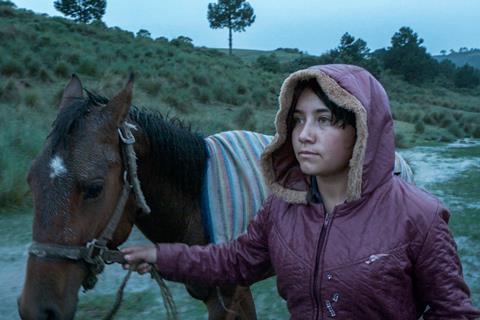Tatiana Huezo’s documentary set in a remote Mexican mountain community is an intimate, immersive portrait of a way of life

Dir/scr: Tatiana Huezo. Mexico/Germany. 2023. 102 mins.
The children of the remote mountain community of El Eco, in the mountain country of Puebla state, Mexico, are used to getting their hands dirty. Not just in play, although the mud-pits and sheep pastures are the backdrop to endless games of imagination. But a child’s life in El Eco is intense and visceral: kids are involved from the outset in the muck and sweat of animal husbandry; they have a front-row seat to both the births and the deaths in the community. The latest documentary from Mexican-Salvadoran filmmaker Tatiana Huezo (Tempestad) is an intimate, immersive portrait of a way of life – its rhythms, hardships and its communal joys – told through the eyes of the young people who rarely question it.
A three-dimensional soundscape that hints at the perils of this beautiful, savage corner of the natural world
One girl, however, looks beyond the boundaries of the village to another life. Unfortunately, she disappears as abruptly and secretively from the film as she does from her family home, one slightly unsatisfying element in an otherwise fascinating and strikingly photographed account of life in rural Mexico. It’s a milieu that Huezo has explored before: the precarious village community in this picture is not dissimilar to that of her acclaimed fiction feature debut, Prayers For The Stolen. Both Tempestad and Prayers enjoyed a healthy festival run, securing numerous awards between them, and both were Mexico’s submissions to the International Oscar category. Following its premiere in Berlin’s Encounters section, El Eco should find a similarly warm reception on the festival circuit but perhaps lacks the forceful punch of the previous two pictures that propelled them into top-level awards consideration.
Prayers For The Stolen told of a plague of abductions among the girls and young women of a village. In El Eco, the rumours of kidnappings elsewhere drift up to the mountain village like mist, but the natural world’s threats to survival are no less pressing. A drought cuts swathes through the livestock and threatens to wipe out the corn crop, an essential staple of the villagers’ diet. During the winter, torrential rains turn the hillside into a quagmire, pitted with treacherous, steep-sided pools which trap unsuspecting sheep.
The film opens with a frenzy of barking and panicked bleating: another sheep has slipped into the water. A mother and her two children, one barely more than a toddler, stage an emergency rescue of the animal, its waterlogged wool adding considerably to its weight. Huezo’s use of sound is urgent and emphatic – before we get to see anything at all, she creates a three-dimensional soundscape that hints at the perils of this beautiful, savage corner of the natural world.
The work of cinematographer Ernesto Pardo (who also shot Tempestad, as well as Ai Wei Wei’s documentary Vivos) is outstanding: his deft, curious lens captures the children’s engagement with and exploration of the world around them. There’s a tenderness and sensitivity to the filmmaking which is matched by the loving care that teenager Monse shows to her frail and ancient grandmother. The responsibility for the elderly woman has been passed to Monse by her frazzled mother, who, in the absence of her husband (the men mostly work away and gender roles are sharply delineated), must shoulder the running of both the family and the farmland.
Monse embraces her new role; she’s distraught when her grandmother finally passes away. But she chafes against the restrictions elsewhere in her life – Monse plans to race her wiry little mountain horse against those of the men in the village, something that her mother categorically forbids. Shortly afterward, Monse disappears to the city, and the film loses one of its most charismatic subjects. It’s a bit of a let-down for the audience, but it does underline the point that loss is a key part of life in this corner of the world.
Production company: Radiola Films
International sales: The Match Factory, info@thematchfactory.de
Producers: Tatiana Huezo, Dalia Reyes
Cinematography: Ernesto Pardo
Editing: Lucrecia Gutiérrez, Tatiana Huezo
Music: Leonardo Heiblum, Jacobo Lieberman
























